Family tree template: visualizing the family history
Updated: October 16, 2024 Author: Vitaly
In this article we will analyze in detail the types of family tree templates, their importance and how to use them. We will also look at tools for creating your own family tree visualization.
Creating a family tree is the final step in genealogical research on the pedigree. After gathering all possible information—like photos, documents, and records—and organizing it, the next goal is to find a clear way to display your family history.
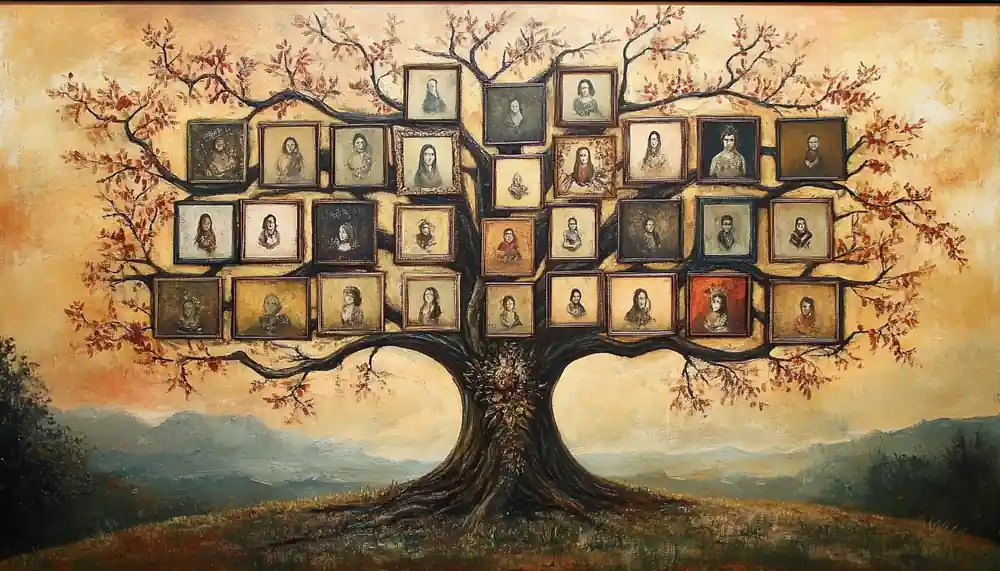
The problem is that there is no universal family tree template or a tool for editing it or creating it yourself. Choosing the right template requires considering not just its visual appeal, but also how much a specific option allows you to clearly show the entire available amount of data about relatives. Some family tree templates focus on visual beauty, using high-quality photographs of ancestors, while others focus on information content.
Typical structures of family tree templates
Let's look at the most common family tree templates, their advantages, disadvantages and application features.
Bowtie
This family tree structure got its name due to its similarity to the shape of a bowtie. It has a central part that connects two sides, designed like “wings.”
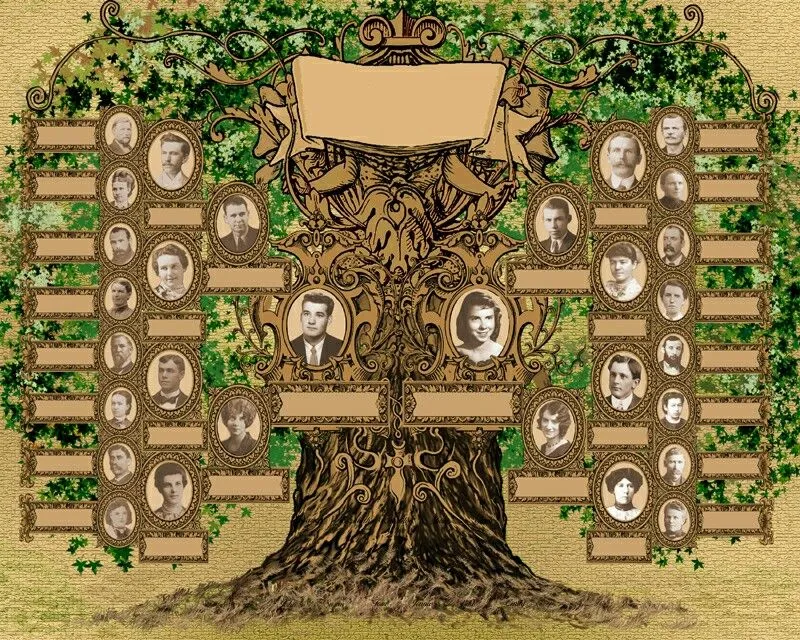
This scheme is great for showing a family tree of a married couple with relatives located on each side and j children below. This creates a beautiful, compact family tree that clearly shows the connections between both generations.
The presented template is good for working with portraits of all relatives, allowing you to place large photographs of each mentioned ancestor. However, Bowtie is not very suitable for situations where you need to reflect a large number of generations or provide detailed information about each. Usually, it works best for up to two generations, keeping the tree straightforward and easy to view.
Also, if you have gaps in information about the nearest generations of ancestors, they will be clearly visible on the Bowtie. Unlike other formats, such as the Hourglass, you can’t easily cover these gaps by rearranging relatives, as any imbalance in the “wings” will be noticeable.
Hourglass
The Hourglass pattern is slightly similar to the Bowtie laid on its side. It combines the ascending and descending tree. In the center there is a person with their ancestors branching upward and their descendants below. Depending on your goals, the Hourglass family tree template can reflect the ancestry of either an individual or a married couple.
Using the Hourglass you can cover a large number of generations and provide balanced information about the past and the future of the family. This scheme is often used for detailed genealogical analysis.
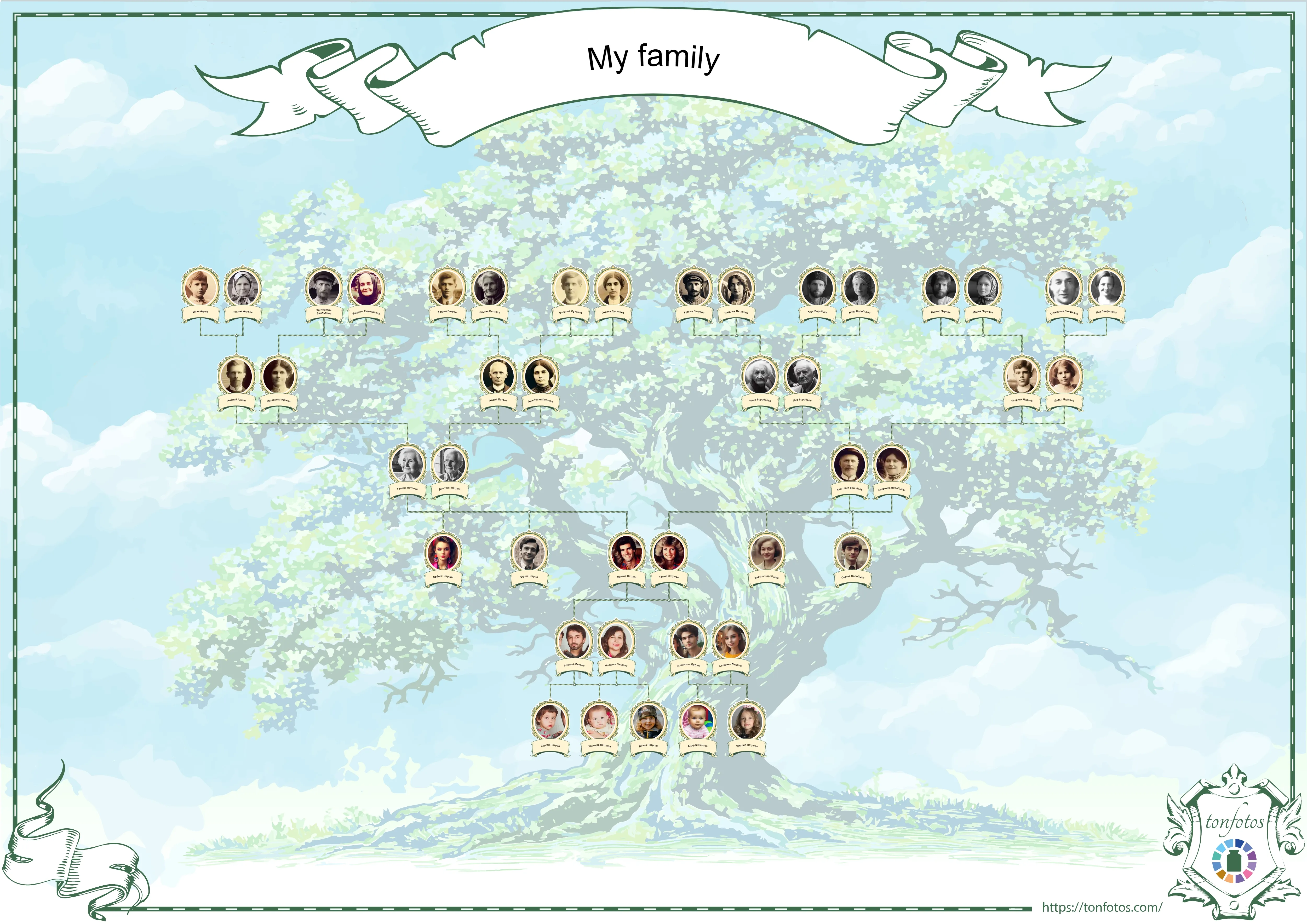
Hourglass is an excellent choice for creating the most detailed and informative family tree.However, when printing, you might have to compromise on the quality and size of the photos used, and in some cases, you may need to leave them out entirely.
To keep the Hourglass design intact, it’s important to focus only on the direct ancestors and descendants of a specific person or couple. However, there is often a desire to add collateral lines (first and second cousins, aunts, uncles, as well as their descendants). This can completely change the shape of the tree: the diagram spreads greatly in width, intersections of family lines inevitably appear, or relatives of the same generation find themselves on different “floors”.
Sun chart
This pattern places the individual at the center with the ancestors arranged in concentric circles around them. Each circle is a separate generation, and the further from the center, the more distant relatives are indicated. This type gives a symmetrical view of ancestors, but is only suitable for displaying an ascending line.
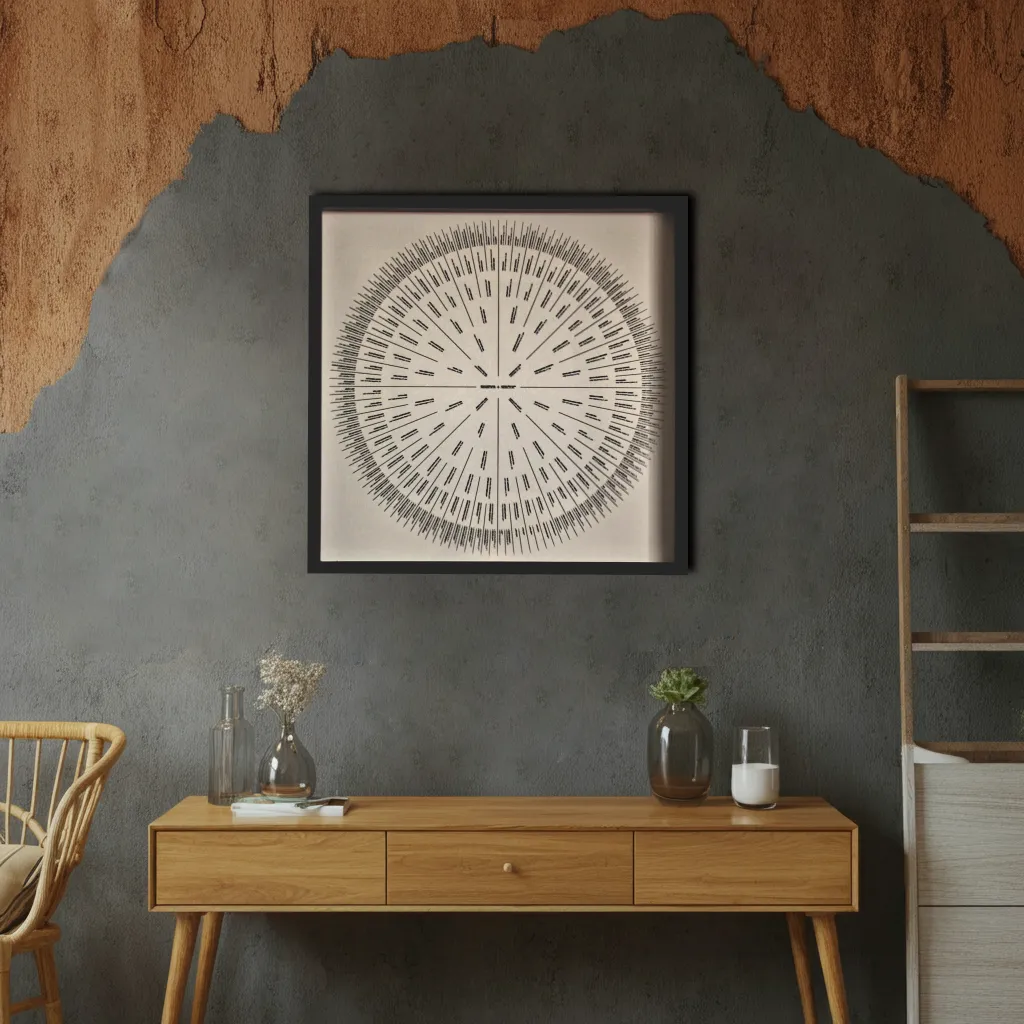
Please note that when using the "Sun chart" family tree template, photographs of ancestors cannot be used, only names. The only photo allowed is the one of the main person in the center. The rest can be presented only in the form of text information, but quite a lot of such information can be placed.
However, familiarization with such a family tree requires close look. If the template is made in asf a digital image, you can use the zoom function to help. The printed version is suitable for study only up close. From a distance it looks like just a pattern that does not carry information (see a typical example above).
Fan
Depending on the central person, the Fan can be ascending or descending. Visually, it resembles the circle of the Sun chart. In the case of the ascending form, you or the person being studied are located at the bottom, and the ancestors are organized in a semicircle upward, starting with the nearest and expanding over several generations. In the descending version, it starts with the founder at the top and goes down to the latest representatives of the family.
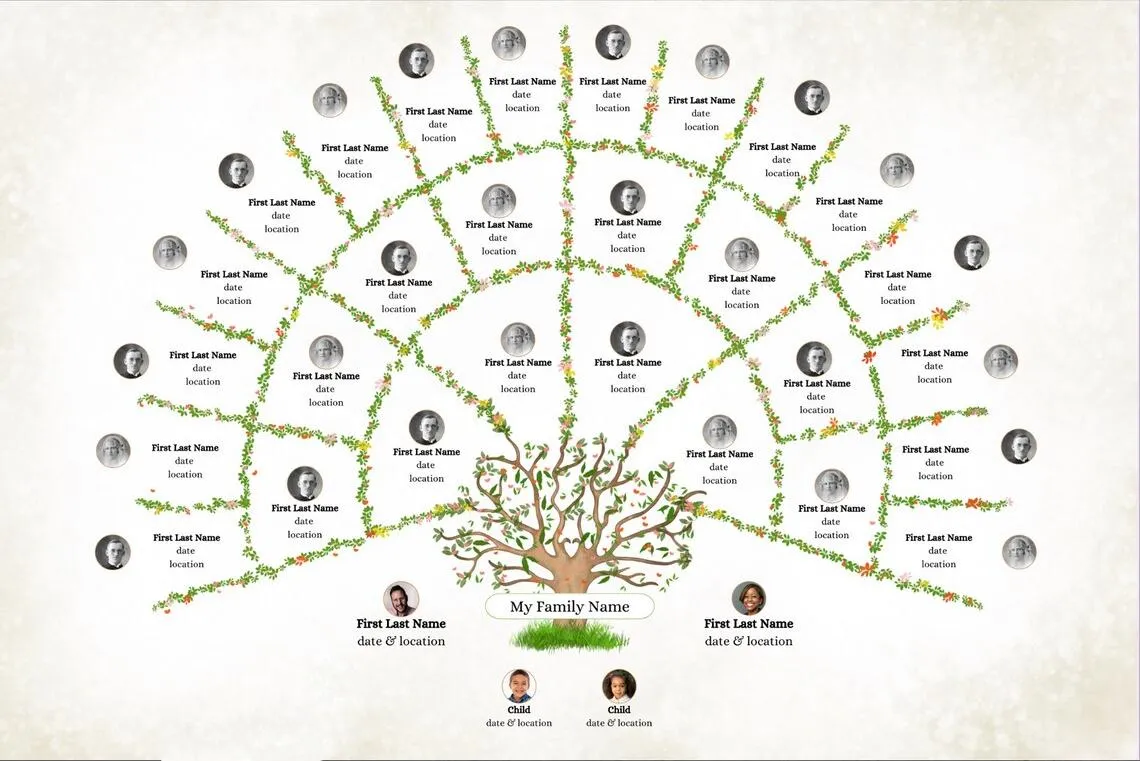
As with the Sun chart, the Fan chart can be hard to read when there's a lot of data or many generations involved, making it better for detailed studies. In addition, posting information requires careful planning, because for each ancestor the amount of information available may differ.
Family tree template options
Family tree templates can differ in layout and format. There are two main ways: on paper or electronically. Let's look at the advantages and disadvantages of each.
Paper templates
You can buy a paper version of the family tree template from a specialized store or the marketplace. Once filled, you can immediately hang it on the wall, give it to relatives, or use it as a family heirloom, passing it on from generation to generation. In addition, some of these templates are sold with the frame, which simplifies the task even more. There are many designs to choose from.
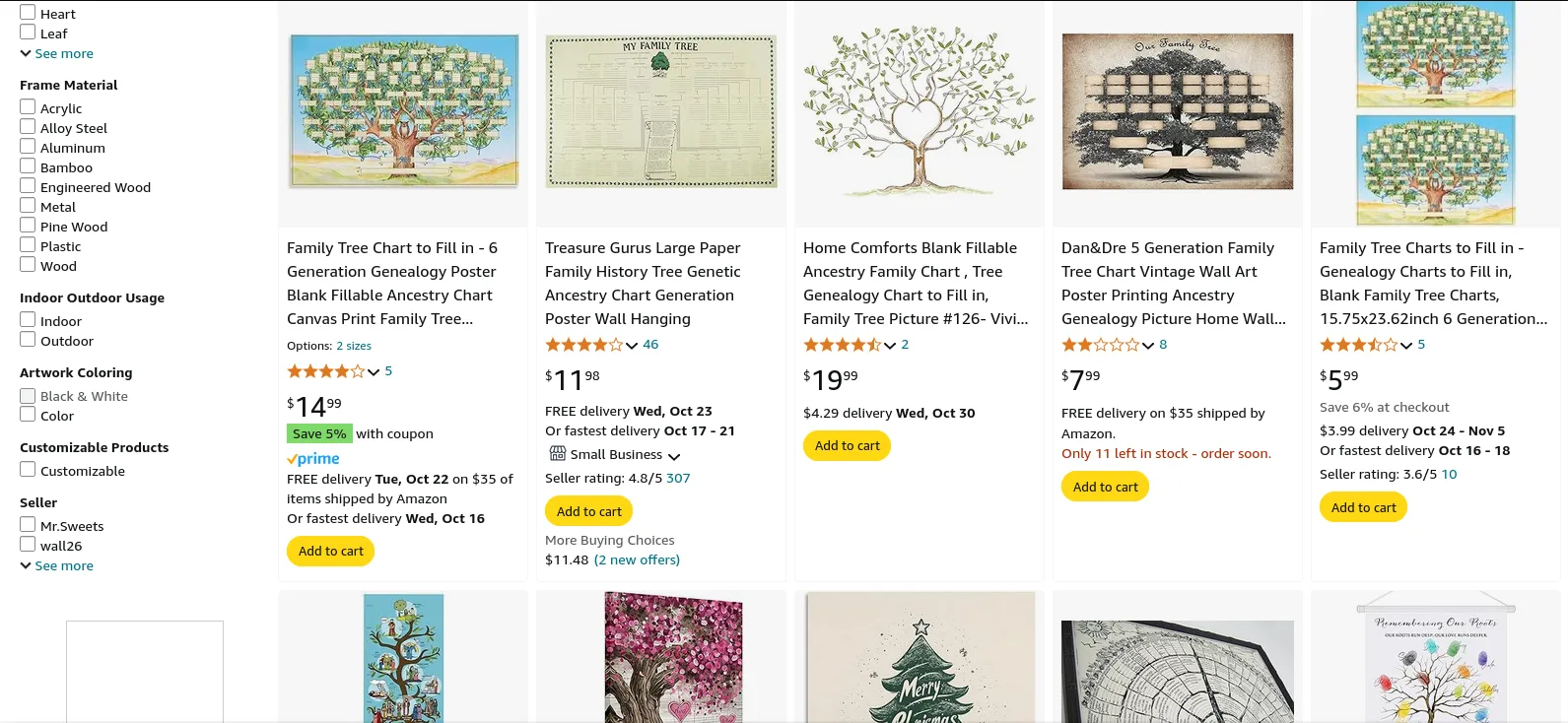
The main and very obvious disadvantage of a paper template is its fixed structure. You cannot add extra branches or hide any that don’t have information, so those sections will remain empty.
Another drawback is that filling it out can be challenging. You may need to print your photos several times to get the right size. You’ll have to cut out the faces by hand before gluing and write the names carefully. Another way is to print the table on a printer several times before you get it exactly right, then carefully cut it into strips and stick it on.
For those who enjoy crafts, filling out a family tree template can be a fun experience. If you do it together with children, it can become for them a kind of educational excursion into family history.
However, if you’re not great at handwriting and don’t want your tree to look messy, this option may not be the best fit for you.
Download template image and edit it
Genealogy is a popular topic all over the world, and you can find thousands of ready-made family tree templates of various styles, formats or types of structures online. In this case, you can choose a template for a program you're familiar with so that editing it will be easy.
To find a suitable template, you can use search engines, Pinterest, or specialized resources, for example, templatelab. The advantage of the latter is that here each template is immediately presented in different file formats.
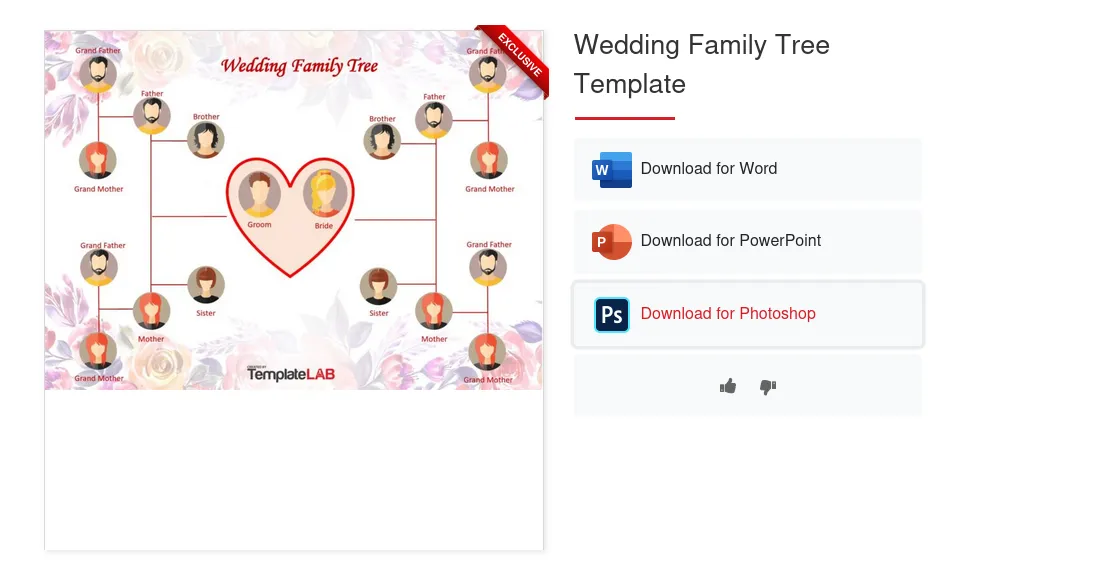
All you have to do is open the downloaded document and make the appropriate changes to it.
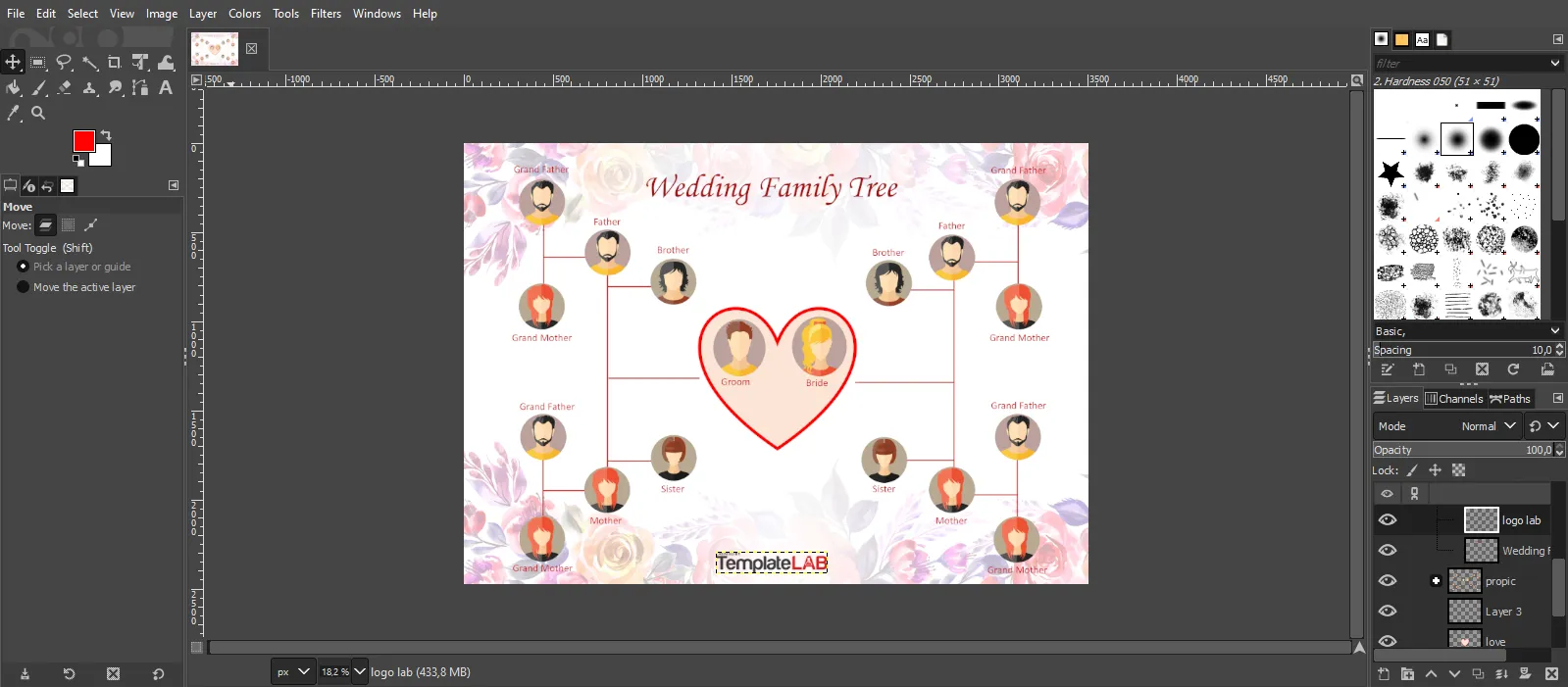
Electronic templates
Electronic family tree templates are very flexible in terms of editing, adding and deleting ancestor data. They allow you to change the design or the entire structure and to use photographs. You can share the tree with your loved ones at any time via email, messenger or social networks.
Despite all the advantages of electronic templates, working with them requires some experience in using appropriate programs (text or graphic editors). Additionally, templates made with specialized genealogy software may not always be good for printing.
The best approach is to first create an electronic family tree for easy storage and editing, and then print it out as a beautiful poster.
Order a tree from a specialist in an individual template
This is the most expensive option, but in this case you will get a truly unique and high-quality family tree template. A professional designer will be able to create a structure that fits the number of people with an individual design style. If the template is created alongside genealogical research, the designer can easily make changes, like adding new branches or reworking existing data.
With a designer, you don’t have to think about what format will be optimal for printing, or how to arrange everything correctly so that the tree turns out not only beautiful, but also easy to read.
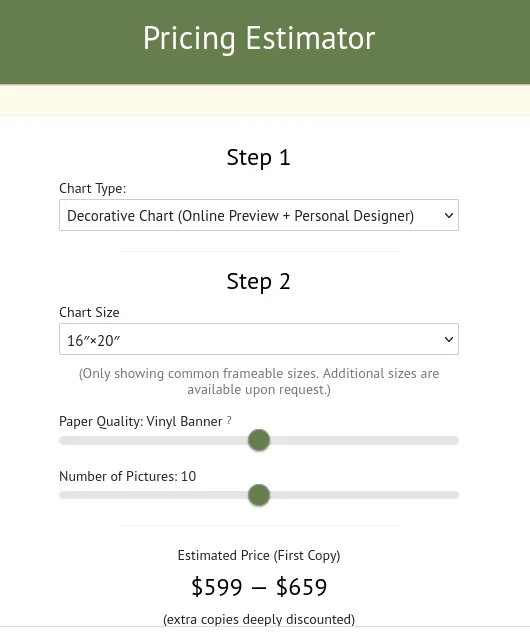
In addition, you can contact a genealogist who will conduct a complete genealogical study of the family tree, right down to the founders themselves. However, the cost of these services depends on the depth of the analysis and may seem too high.
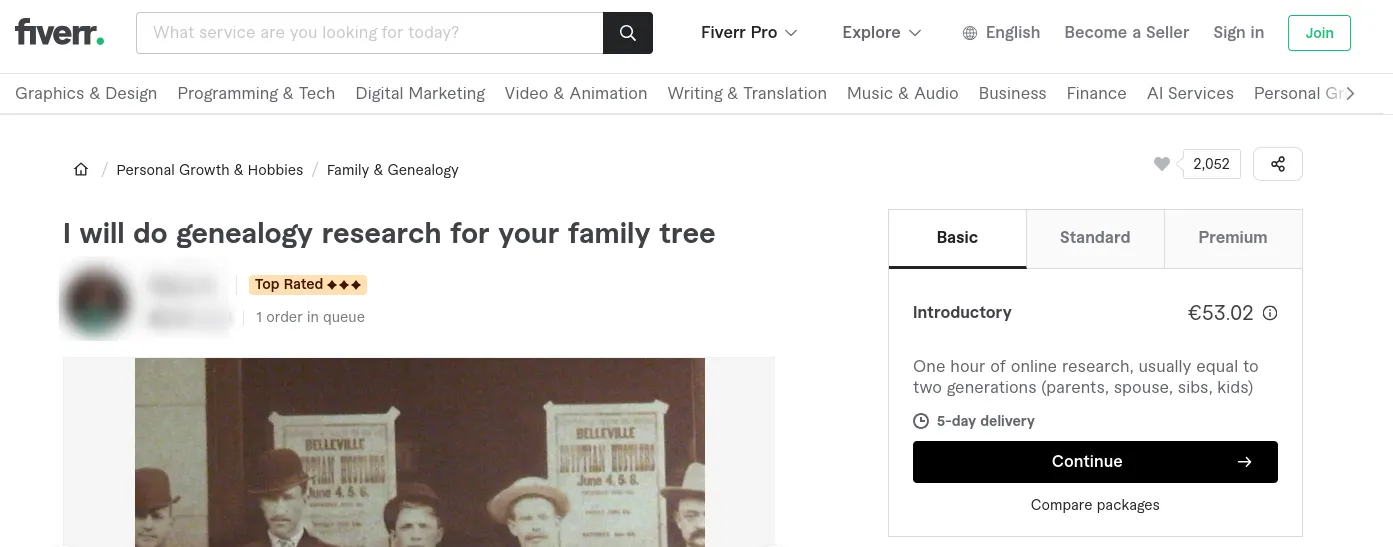
This option is suitable for those who want to fully study the history of their ancestors, learn about their origins, and are willing to invest in the process.
Tools for creating a family tree
When choosing an application for creating a family tree, you first need to focus on ease of use. This is especially true when adding information about ancestors and visualizing the tree..
Using Tonfotos to create a family tree
Tonfotos offers users a non-standard approach to creating a family tree. It’s primarily a program for organizing your family photo collection, but starting with version 1.10.0, it now includes the option to automatically generate a family tree image. The final output is a beautifully designed family tree with a resolution of 5000x3335 and a color depth of 24 bits, which is optimal for standard printed formats: A4, A3 or even A2.
This is a truly unique solution that is not found in any of the existing photo archive catalogers. At the same time, you do not need to download anything or pay for cloud storage. All photos and data about ancestors are stored on your computer. You can add or delete information and change connections whenever you discover new facts during your genealogical research.
The program offers several tree design templates and the ability to choose between the two most popular person layouts: Bowtie and Hourglass.
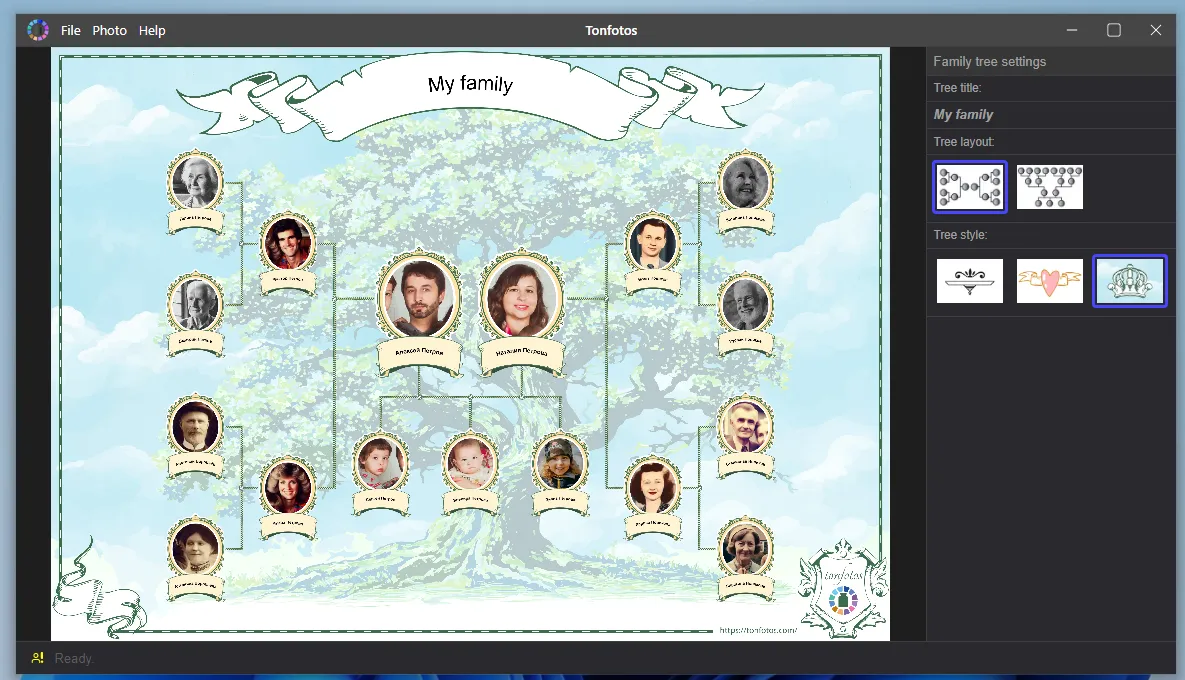
To generate your own family tree, first create person profiles. To do this, simply write down the first and last names of the people whose faces Tonfotos detects in the photo using the built-in neural network. You just need to tag a person once, and the program will find his/her face in all other photographs in the photo archive.
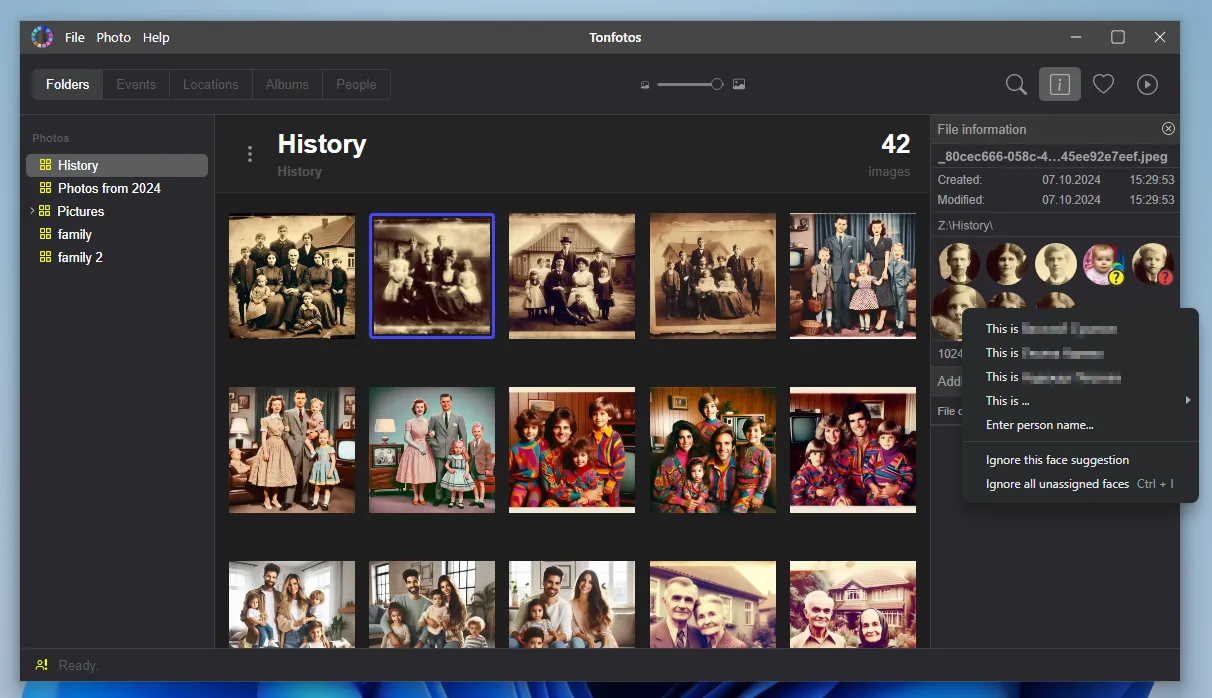
When all the required persons are checked, go to the “People” tab of the main menu and create the appropriate family connections. You can also add extra information about each person if needed.
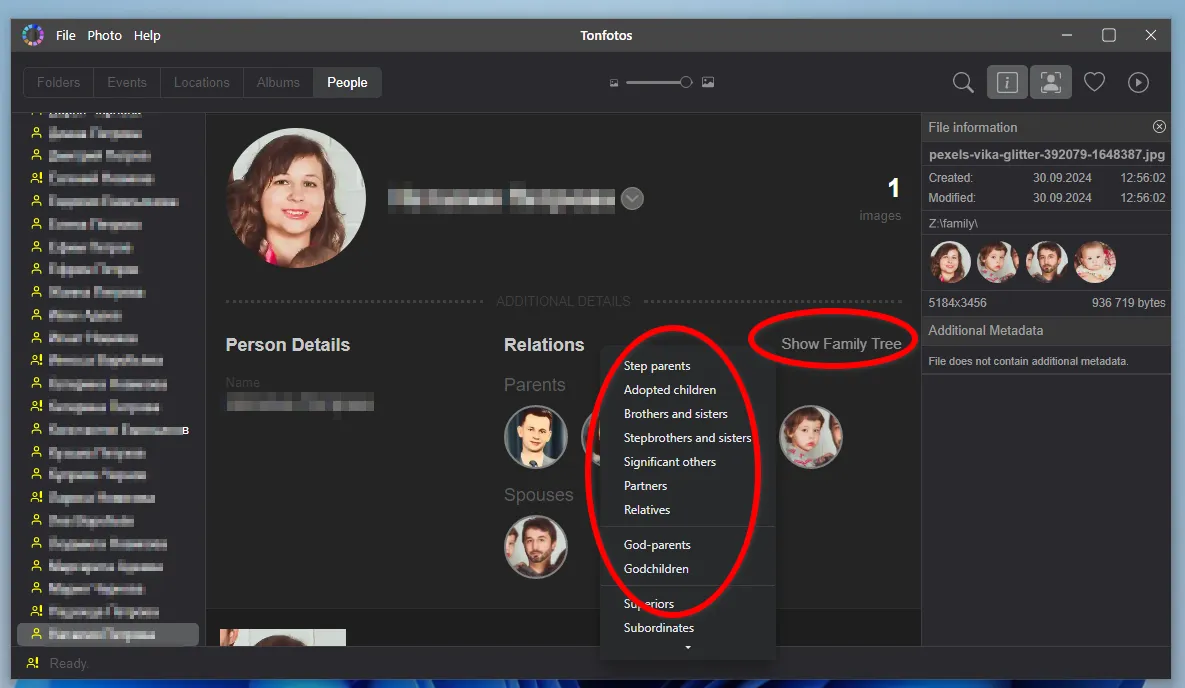
After you assign who is related to whom, each person’s profile will automatically create its own family tree.
In addition, the program has other useful functions for managing digitized archival photographs.
- Removing duplicates. Tonfotos can search for and remove duplicate photos in the archive.
- Determination of location. The program uses geolocation data to find out where each photo was taken and shows the location on a map.
- Creation of albums. Users can organize their photos into albums, making it easier to find and organize photos.
- Editing photo description and title metadata. You can change or add details about the images, such as titles and descriptions, which helps improve organization.
To use all these features, the free version of Tonfotos is enough. You only need to pay for a perpetual license if you want to create a family tree of 12 or more people.
Online constructors for creating a family tree template
One example of such services is FamilySearch. It has a simple and intuitive interface. To create a family tree template, you just need to fill out person profiles. The service offers several structure options at once.
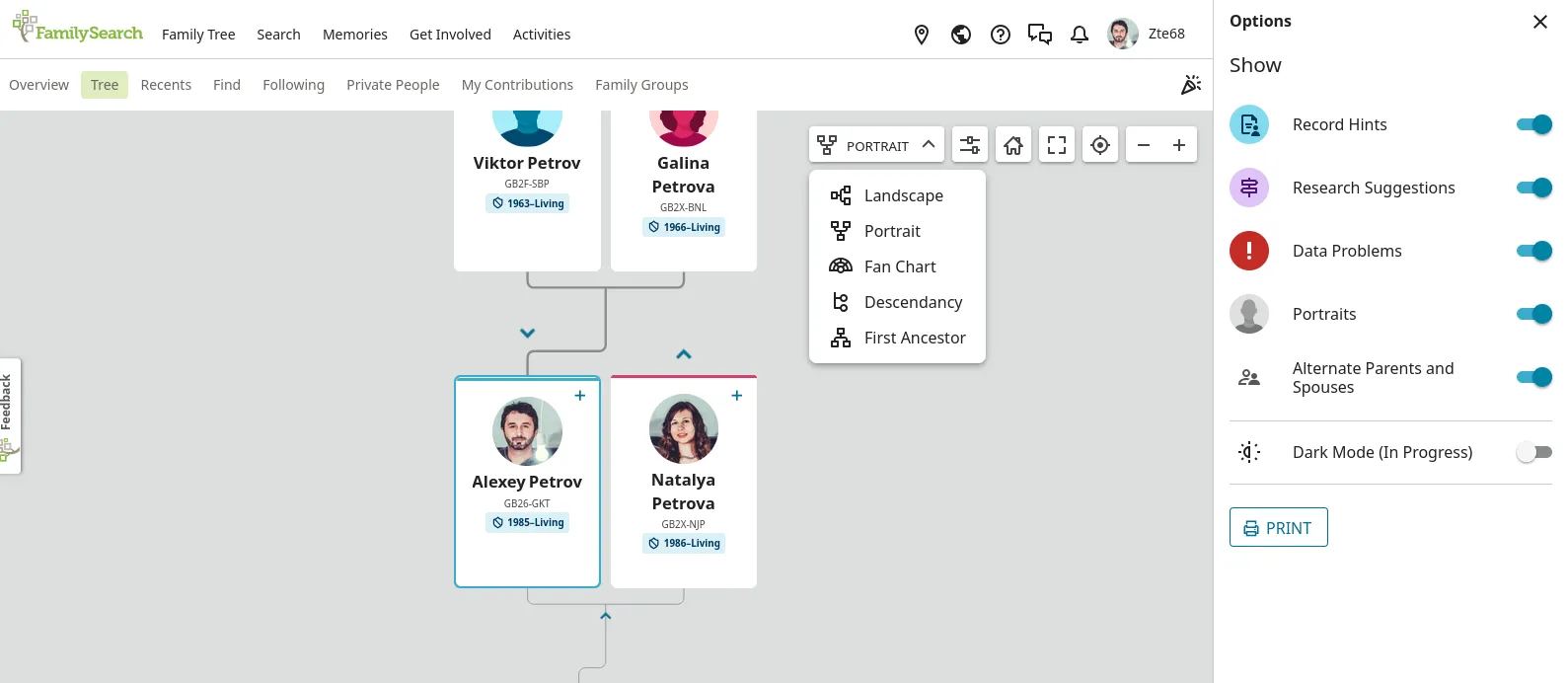
The card of each added person has not only basic information and information about family relationships, but also additional data. For example, it can show where you were born, where you worked and other facts.
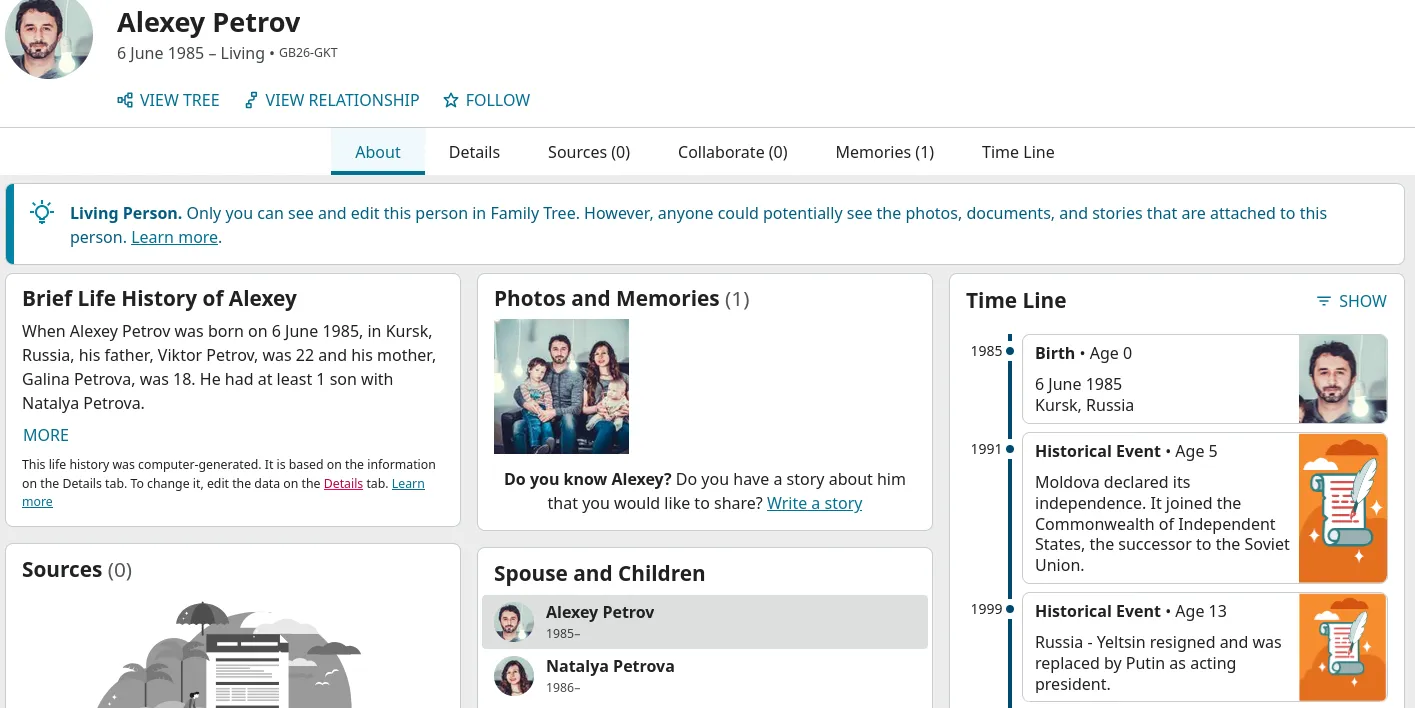
When you save a file for printing, the family tree will keep the structure you chose in the service settings.
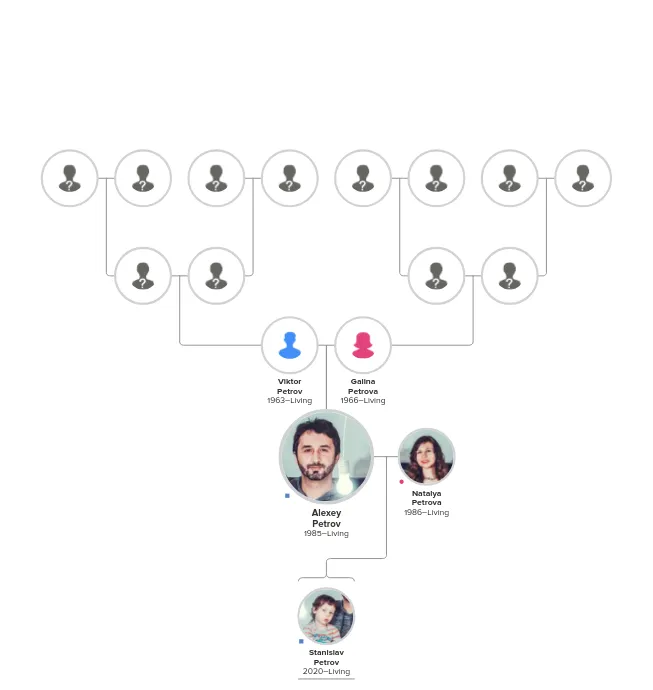
Although the resulting image reflects family ties in the pedigree, you may try to edit it in a graphic editor or get help from a designer for a more attractive look.
Conclusion
When choosing the right tool for creating a family tree, it is important to consider your goals: visual appeal, information content, or ease of working with data. Templates and software solutions can make the process easier, but they may have limitations in flexibility or require time to learn.
In this context, Tonfotos stands out with its all-in-one approach. Besides working with photographs, it can automatically generate family connections and provide ready-made diagrams for printing. This makes Tonfotos a great choice for those who want both informative content and good visuals, without spending extra time on editing.